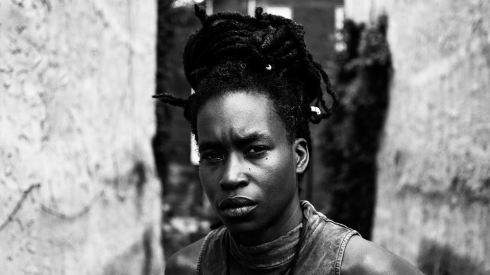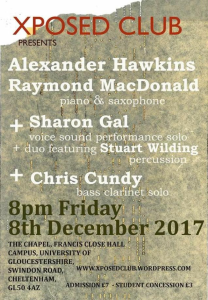(The third original Confinementeer, Jesse Cutts, has his own follow-up single too, but more on that later…)
Unlike the archived cover versions refurbished for the previous EP, ‘Bright Fivers’ is an all-new, all-original April recording in which Chris contributes as the anagrammatic Cola Ray, collaborating with Bic and Jo’s MUMMY. Initially, it’s his arpeggiating pianos (distanced and tinny, as if pulled from a dusty old 78) which dominates ‘Bright Fivers’; a solemn setting for Jo’s singing, which is loaded with both trepidity and authority. That’s only the prelude, though, and it’s severed from the rest of the piece by a jump-cut edit as loud and merciless as a sucker punch or an axe blow. You even hear the clunk as the mood shifts; Jo switching abruptly into deadpan recitation against a Bic backdrop of guitar static and wind texture, as impassive as the prophetess taken over by the voice of the prophecy.
Whether sung or spoken, the sentences are broken off; dark, punching surrealist gobbets of foreseeing and ruin. “Silence in the air. / Things endure, things evolve. / Between the slopes fivers fly up onto the dream floor. / Fire spreads her text of flame as serious as food / Our towers of graph paper fold up into the silence, / delicate as the girl who leaves the stone and the water – / and the bright moan of the green, / the collapse of a black age. / In the end we never know what we know.” It sounds like something buried deep in peat in order to time-travel; transmitting a warning, or possibly a testament.
‘The United Kingdom’ is (mostly) another eleven-year-old recovering from Jo Spratley’s Babyskullz solo project: one which just happens to fit in with ‘Bright Fivers’. It’s another recitation, delivered by Jo to pattering drumbox and orchestrated in minimal, thrifty make-do fashion. Two-finger melodica. Guttural just-picked-it up guitar lines and milk-bottle vibraphone. Cobwebby analogue synth gurgles, dub distancings and dirty blats of fireworks.
Something about the rhythm and chant suggests the cheesy old white-rap anti-classic ‘Ice Ice Baby’. Everything about the words doesn’t, as Jo narrates (in newsprint monotone) a set of disappearances. “A man who hears bells who loves cars” misses his train only to drop out of routine and out of existence; a corporate lawyer vanishes during her solo boat trip; fifty years ago, a cancer specialist who “wraps her dolls in graph-paper by the light of the moon” is last seen in car headlights by the edge of a cliff. All three are obliquely connected by hearts: their rhythms or their interruption, their presence as eviscerated occult trophies or as enigmatic markers; presumably also by the locked-up desires, secrets and clues they contain. All cases are left open; mysteries which slip into shadowed corners of modern folklore or Lynchian dreams. There’s a stress on the regular and on the irregular, but no conclusion on either.
As haunting as this can be (and it does build on regular repetition, an inconclusion which nags to be solved), it’s still Bic’s dark-psychedelia project Mikrokosmos which dominates this particular set, providing three tracks out of the five. Two are brief snapshot instrumentals, deliberately left incomplete or brought to dismissive halts. Recorded in 1993 during Mikrokosmos’ cramped early sessions in west London, ‘In the Machine Room’ is an jarring but strangely satisfying hybrid of claustrophobic paranoia and sweet naivety. An uncomfortable electronic hum and weirdly organic rattling (like mice beginning to panic inside a generator housing) passes into a bright nursery march played on assorted guitars, drums and bombastic little synths. For forty-eight seconds, post-industrial grot tussles with twinkly daydream.
I assume that Bic escaped from whatever it was that was polluting him: ‘Frag. Familiar’, from 2014, was completed nearly two decades later (long after Bic had quit London), but it missed the boat for Mikrocosmos’ ‘Terra Familiar’ abum. It’s as confusing as its predecessor. A sustained cosmic slam: a huge guitar downchord which is allowed to trail away, while delicate waltzing keyboards come forward to shine over the top. They dance with another brutally distorted guitar line – butterflies courting Bigfoot – before everything hits the wall, topples over and cuts off. There’s a farcical humour to this music. It shows you the stars but then suddenly pulls away the rug, or drops the time-clock on the telescope viewing: almost deliberately crass in the way it brings you back down to earth with a bump. I suspect that there’s a touch of reverse psychology here. To move forward properly, you have to overcome the bumps, denials and trip-ups.
Another ‘Terra Familiar’ outtake, ‘Cell by Cell’, is more substantial and developed: a six-and-a-half minute song rather than a peculiar fragment. It’s also a dubbier return to Bic’s Dark Star days: almost a Massive Attack take on that band’s life-scarred fin-de-siècle urban psychedelia, taking in similar elements of Hawkwind space rock and Killing Joke post-punk grimness to offset Bic’s sighing, waify sweetness. There’s a Dark Star-ish sense of resignation too, a voice-of-the-casualty effect as Bic reflects on exhaustion and disassociation, on being swallowed by routine and self-absorption. ‘Just swim, / float to the surface – / as if it’s so easy, you show me again. / But time weighs me down so gently / and all our ideas just drift away, / sinking, / lost in the moment. / Ennui is so easy / and to the end we divide. / Cell by cell to solitary worlds – / undesigned, undesired. / Islands in an ocean of thought / turning inwards defied / to meet with the gaze of impermanence eyes…’
The formal Confinement message for this EP is one of “a constellation of songs brought together by this rarefied time. Pulled through the thickness of life and her knowing machine. Mixed and mastered in April 2020 and flung into the dark of these ends of days. Here we are. All alone, together, as one.” As a message of solidarity, it’s an ambiguous comfort: but, as they say, here we are. Questions unanswered. Brutal breaks in expectations. People disappearing, grips gradually lost. Name it, share the names, and perhaps fight it.
Mikrokosmos/Babyskullz/Cola Ray vs. MUMMY: ‘CONFINEMENT-release3’
The Confinement Tapes, CONFINEMENT-release3
Download/streaming EP
Released: 7th May 2020
Get it from: free or pay-what-you-like download from Bandcamp (As with all Confinement Tapes releases, any money earned goes support care funds for Tim Smith, Tim Quy or Jon Poole of Cardiacs – see previous posts.)
Babyskullz (Jo Spratley) online:



































































